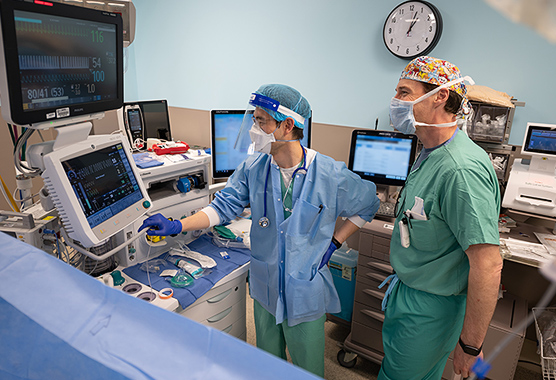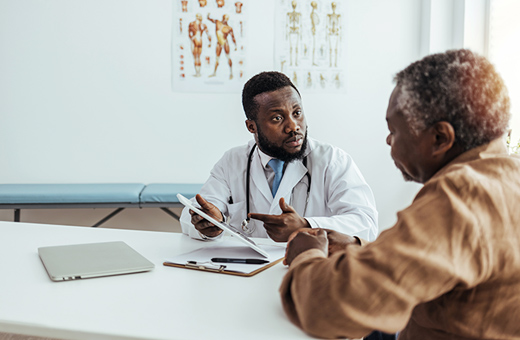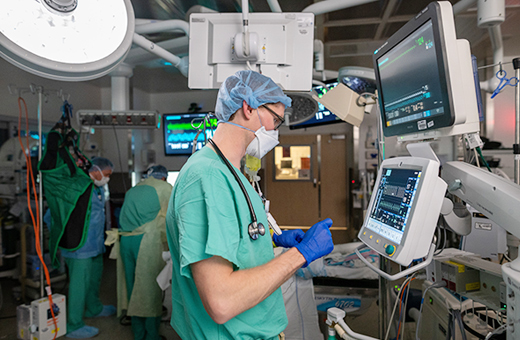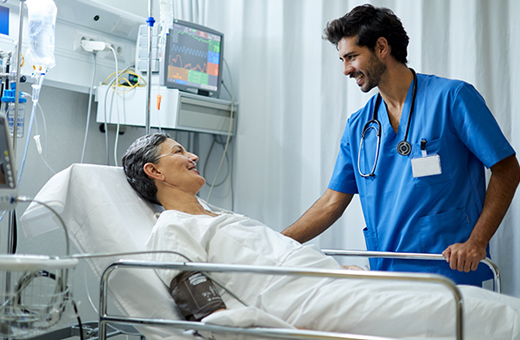Neuroanesthesia
UC Davis Health offers specialized anesthesia that protects delicate brain, spine and nerve tissue while keeping you comfortable.
Medically reviewed by Christian Bohringer, M.B.B.S. on Nov. 28, 2023.

Specialized Anesthesia During Brain Surgery
UC Davis Department of Neurological Surgery has an internationally recognized neurosurgery team. Neurological surgery treats issues affecting your nervous system, including your brain, spine and nerves throughout your body.
Our designated team of neuroanesthesiologists closely monitor you during procedures. We are experts at caring for patients with:
- Aneurysms
- Brain tumors
- Deep brain stimulation devices
- Head injuries
- Spinal cord problems
- Stroke
Neuroanesthesiologists give drugs to block pain and sensation. They also keep the pressure inside your skull at the right level. This makes sure your brain gets enough blood flow during and after surgery.
Types of Neurosurgical Anesthesia
We offer a range of neuroanesthesiology services. The best option for you depends on the type of surgery you’re having. We explain risks and benefits and answer your questions so you can feel confident about your upcoming procedure.
General Anesthesia
You receive drugs that put you to sleep, block sensation and make you lose consciousness. These effects are temporary and last the whole procedure.
Regional Anesthesia
We use regional anesthesia for select neurosurgical procedures, like spinal fusion. This technique involves injecting pain medication directly into your spine.
Sedation for Awake Craniotomy
During an awake craniotomy, we need you to be conscious so we can perform certain neurological tests. While brain tissue itself doesn’t have pain sensors, the surgery can still be frightening. We give a sedative drug to help you stay calm during the process.
Request an Appointment
As Sacramento's No. 1 hospital, you'll benefit from unique advantages in primary care and specialty care. This includes prevention, diagnosis and treatment options from experts in 150 specialties.
Referring Physicians
To refer a patient, submit an electronic referral form or call.
800-4-UCDAVIS
Patients
Call to make an appointment.
Consumer Resource Center
800-2-UCDAVIS
Before undergoing neuroanesthesia, we explain how it works and what to expect. Neuroanesthesiologists answer any questions you may have so you feel more prepared for your procedure.
-

Before Neuroanesthesia
Preparation for neuroanesthesia often starts well before procedure day. Specialists work with other members of your care team to learn about your medical needs. These efforts include reviewing the results of previous tests and discussing surgical goals so we can tailor pain management to your needs.
-

Anesthesia During Brain Surgery
You receive anesthesia medications through a breathing mask, injection or intravenous (IV) line. Once the drugs take effect, you temporarily lose sensation. If it’s general anesthesia, you also lose consciousness. Neuroanesthesiologists perform ongoing monitoring to assess the drug’s impact on your brain and nerve activity. They make adjustments as necessary to keep you safe.
-

After Neuroanesthesia
You may feel groggy or nauseous as the anesthesia wears off. Our team keeps a careful watch over your recovery. It’s often necessary to stay in the hospital overnight. For complex conditions or procedures, you may stay several days.
Home Care After Neuroanesthesia
Recovery from neuroanesthesiology often continues at home. Following our team's care instructions can help you resume daily activities when the time is right.
Take It Easy
Depending on the type of procedure, you might not feel like yourself for a few weeks. During this time, it’s essential to get plenty of rest.
Keep All Check-Up Appointments
Following up with your care team can keep your recovery on track and help you get the most out of your procedure.

Ranked among the nation’s best hospitals
A U.S. News & World Report best hospital in cardiology, heart & vascular surgery, diabetes & endocrinology, ENT, geriatrics, neurology & neurosurgery, and pulmonology & lung surgery.

Ranked among the nation’s best children’s hospitals
U.S. News & World Report ranked UC Davis Children’s Hospital among the best in pediatric nephrology, orthopedics*, and pulmonology & lung surgery. (*Together with Shriners Children’s Northern California)

Ranked Sacramento’s #1 hospital
Ranked Sacramento’s #1 hospital by U.S. News, and high-performing in aortic valve surgery, back surgery (spinal fusion), COPD, colon cancer surgery, diabetes, gynecological cancer surgery, heart arrhythmia, heart failure, kidney failure, leukemia, lymphoma & myeloma, lung cancer surgery, pacemaker implantation, pneumonia, prostate cancer surgery, stroke, TAVR, cancer, orthopedics, gastroenterology & GI surgery, and urology.

The nation’s highest nursing honor
UC Davis Medical Center has received Magnet® recognition, the nation’s highest honor for nursing excellence.

World-class cancer care
One of ~59 U.S. cancer centers designated “comprehensive” by the National Cancer Institute.

A leader in health care equality
For the 13th consecutive year, UC Davis Medical Center has been recognized as an LGBTQ+ Healthcare Equality Leader by the educational arm of America’s largest civil rights organization.
